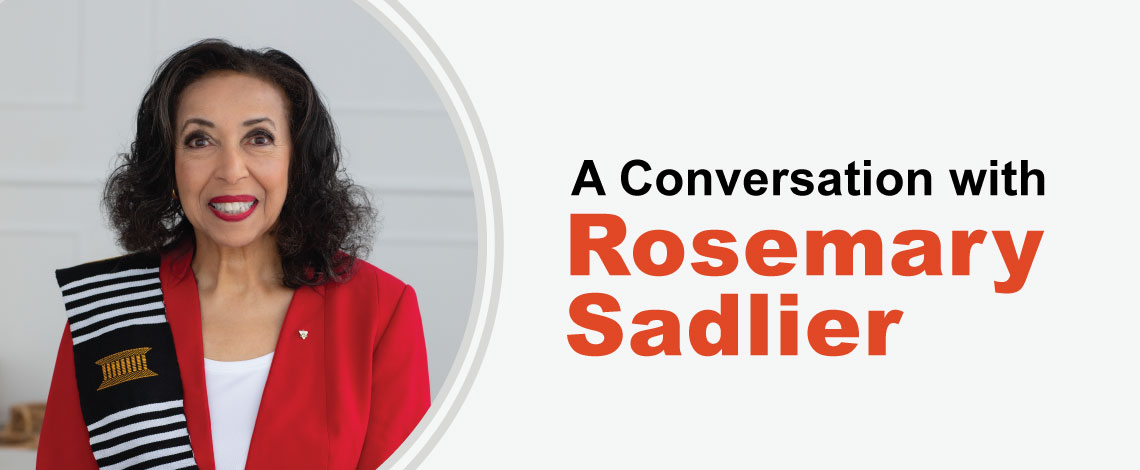February was formally recognized as Black History Month by the Government of Canada in December 1995, following the advocacy of Rosemary Sadlier, O. Ont (Order of Ontario) in collaboration with the Honourable Dr. Jean Augustine P.C., C.M., O.Ont., C.B.E.
A former public Council member of the College, Rosemary Sadlier is a social justice advocate, researcher, writer, DEI consultant, and international speaker on Black history, anti-racism and women’s issues. She has also served as president of the Ontario Black History Society for over 22 years.
We sat down with Rosemary for her insights on Black history and how RECEs can expand their Black history learnings and appreciation to inform their awareness and practice.
Thank you for your time, Rosemary. Let’s begin talking about the intentions behind Black History Month.
Black History Month is an invitation for everyone to commemorate the achievements of Black Canadians from all periods of Black history, while acknowledging the ongoing realities of anti-Black racism.
While Black History Month was intended to be a time for learning and reflecting on Black history and heritage, and for celebrating milestones, it’s important to be mindful that learning is a journey that is lifelong. Black History Month was never meant to be the only time we focus on or acknowledge “Blackness.”
Many RECEs, through their education and practice, are mostly influenced by Eurocentric scholars and educators. Why is it important for RECEs to learn about teachings and experiences beyond these perspectives, including those of Black scholars and educators, in their work with children and families?
We are all part of systems that have focused in most cases on the work, perspective, values and ideas of Eurocentric scholars and educators. This is particularly the case if you attended primary and high school in this country, come from a colonized country that followed a British/European curriculum, or were educated in Europe. Historically, education has also been delivered by academics and educators who likely originated from one racial background and often from one gender. The very specific education and practice of our RECEs is formed from that core basis of knowledge.
It’s important for RECEs to learn about teachings and experiences beyond these perspectives because we are dealing with diversity at its earliest stages: a diversity of children, of cultural backgrounds, of homes. The children in our care may come from a home environment where there is not just one race, or where different norms are followed.
On the other hand, if we have a situation where all of the children in our care happen to be white and perhaps from the same cultural background, wouldn’t it be a disservice if we did not broaden their horizons, so that later in life, when these children come across new neighbours, new classmates, new colleagues, they would not be surprised encountering people who hold different values and do not look like them?
To prepare young people for the lives they will go on to live with others — is this not the very essence of being an RECE? If we have children of African origin in our care, how do we affirm them in their own identities and their own realities if we ourselves are not familiar with some of what that might mean?
What role can RECEs play in the teachings and discussions on issues including Black history and anti-racism?
I am so excited and happy for the role that RECEs can play in the teaching and discussion on Black history, racism, skin colour, identity and social justice matters. Beyond families of the children we have in our care, RECEs are likely the most influential person that the child will encounter. Similar to a parent, an RECE’s words and behaviours can build them up or tear them down. What do we want in our future? Do we want children who are strong and confident and caring, or do we want children who continue to hold onto views that no longer serve their growth, nor the advancement of a progressive society? There is a professional responsibility for an RECE, and for all professionals, to continue to learn and build our practice, and this is an additional way to do so.
What is Black joy? How do you bring Black joy in early learning settings? What does that look like?
Is Black joy different than joy in general? In a way, it is. Any child can be happy because there is ice cream and/or pizza, or some special treat that they might be offered, a special trip that might be exciting.
But what is Black joy? That’s when a person can enjoy and “be” and celebrate who they are in their own reality! Black children deal with the reality of microaggressions and lack of representation on a daily basis. When the texture of their hair is not a cause for ridicule, when the width of their nose is not subject to joking, when the colour of their skin is seen as beautiful, when they are accepted as they are, without concern for negative comments from others — that is Black joy! It is the security of being.
Black joy can also be supported in ongoing efforts to display Black people doing fun and loving activities, or figures from Black history like Harriet Tubman, Mary Ann Shadd or Josiah Henson. There are books that can be read aloud or music that reflects many backgrounds and cultural traditions. RECEs can allow themselves, and the children they interact with, time for reflection and learning all year long
What resources and support are available to RECEs to incorporate learnings on Black history in their practice or day-to-day work?
For RECEs who are looking to build their education on Black history and anti-racism, there are supports available. Here are a few I would recommend:
Books
- Educating African Canadians, Edited by Keren S. Brathwaite & Carl E. James Lorimer
- The Queen’s Bush Settlement: Black Pioneers 1839 – 1865 by Linda Brown-Kubisch
- A Safe Haven: The Story of the Black Settlers of Oxford County by Joyce A Pettigrew
- The Maroons in Nova Scotia by John N. Grant
- Race, Space and the Law: Unmapping A White Settler Society by Sherene H. Razack
- Black History: Africa, the Caribbean and the Americas by Rosemary Sadlier
- Harriet Tubman: Freedom Seeker, Freedom Leader by Rosemary Sadlier
- The Kids Book of Black Canadian History by Rosemary Sadlier
- The Only One by Rosemary Sadlier
The College recommends additional reading:
- Celebrating Black History: February and Forever
- Does learning about anti-Black racism count as a professional learning activity? Absolutely!
Download a PDF version of this resource list here.

Rosemary shares interesting facts about the Black experience in Ontario:
|

